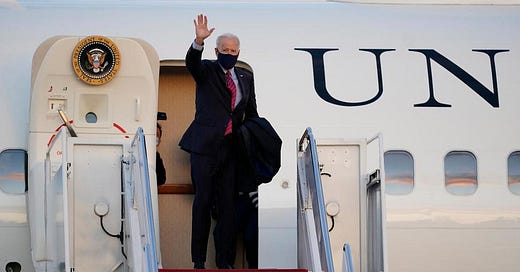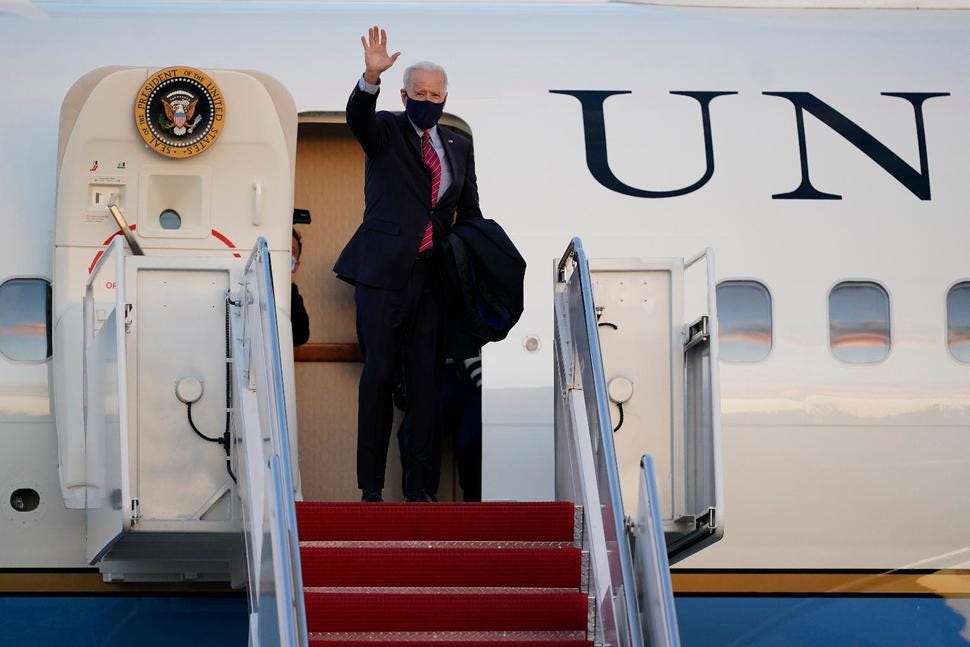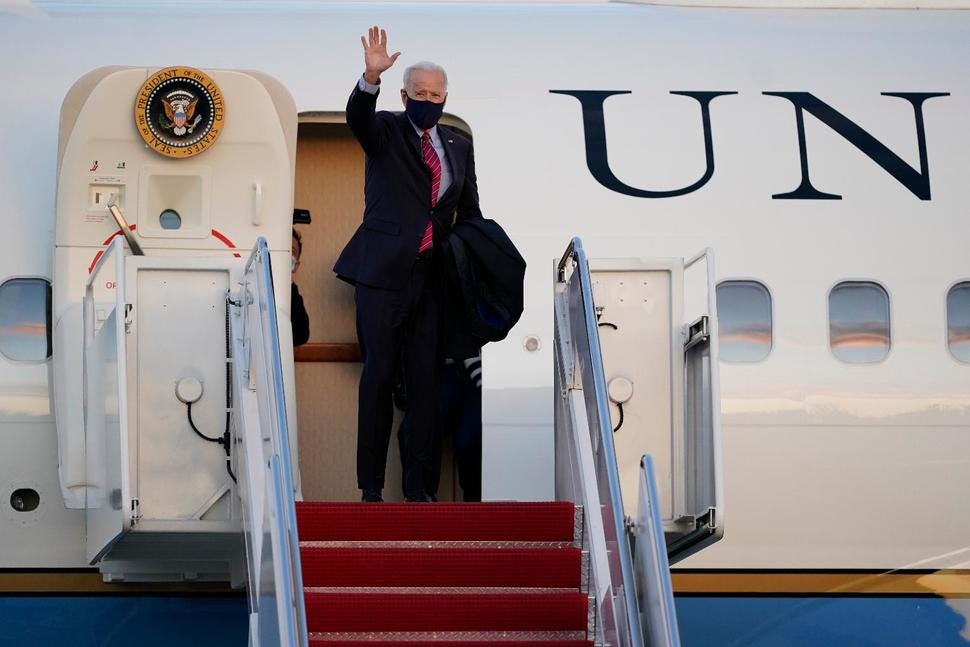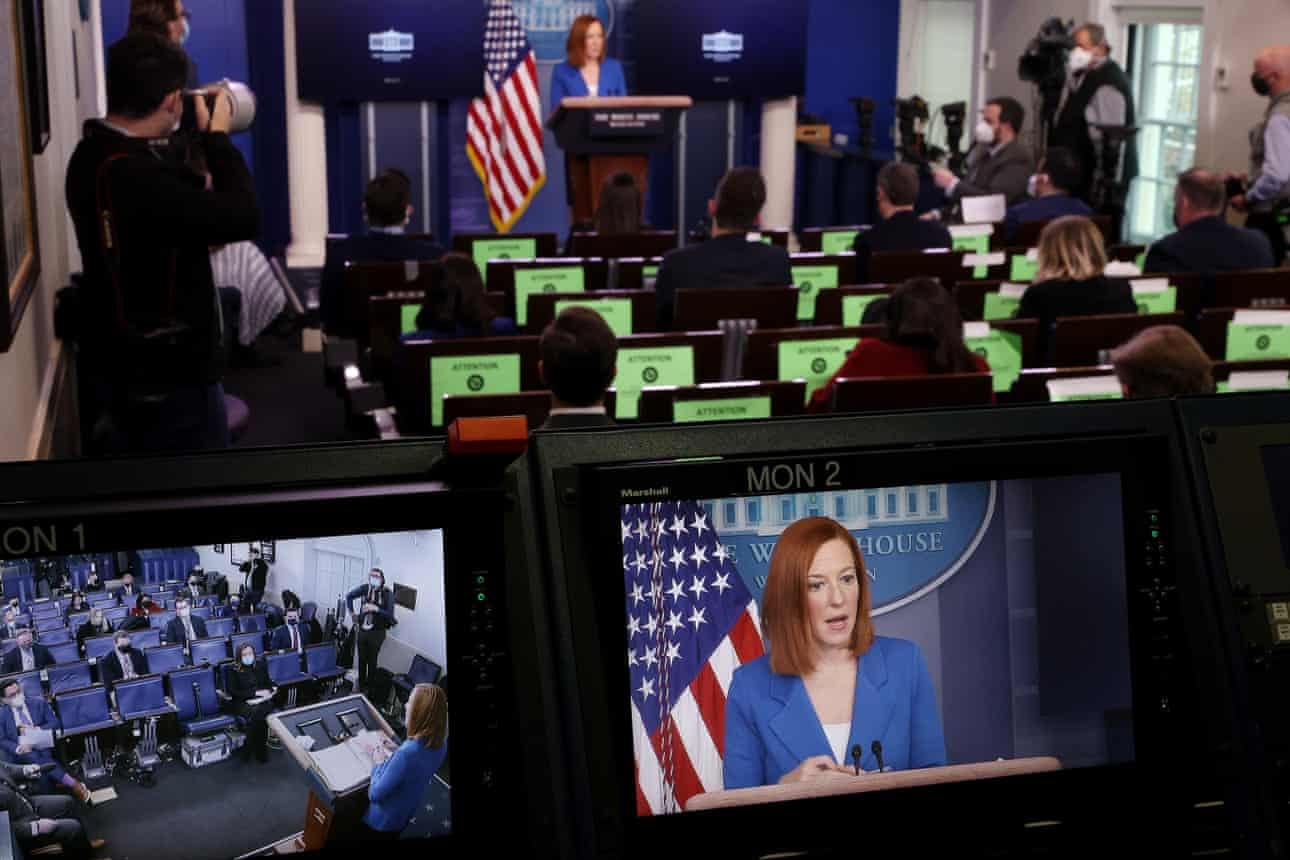Good morning! It’s Monday, June 7, 2021. Election Day 2022 is 519 days away. Election Day 2024 is 1,247 days away.
As U.S. coronavirus cases plummet, Americans are traveling once again. President Joe Biden and Vice President Kamala Harris are no exception.
Both Biden and Harris will embark this week on their first foreign trips since taking office, a pair of high-stakes tests for the two leaders.
Biden will leave Wednesday for a weeklong tour of Europe. The trip is scheduled to include stops at the Group of 7 (G7) Summit in the United Kingdom and the North Atlantic Treaty Organization (NATO) Summit in Belgium, as well as meetings with British Prime Minister Boris Johnson, Queen Elizabeth II, Turkish President Recep Tayyip Erdogan, and Russian President Vladimir Putin.
Biden’s main goal for the trip is to shore up America’s transatlantic alliances after four years of fraying during the Trump era.
Former President Donald Trump regularly made waves at the ally summits Biden is attending, either by lashing out at America’s partners or refusing to sign on to joint statements or walking out early.
Biden wants to signal that those days are over: “This trip is about realizing America’s renewed commitment to our allies and partners, and demonstrating the capacity of democracies to both meet the challenges and deter the threats of this new age,” he wrote in a Washington Post op-ed previewing the voyage.
The marquee summit with Putin will be another chance for Biden to draw a contrast with his predecessor. While Trump famously broke with the U.S. intelligence community during a summit in Helsinki to accept Putin’s claims that Russia had not interfered in the 2016 election, Biden has promised to take a tougher line on the Russian leader during their meeting in Geneva.
“There will be no doubt about the resolve of the United States to defend our democratic values, which we cannot separate from our interests,” Biden wrote in the Post.
Harris’ own foreign travels will take her to Latin America. She touched down (after a minor delay) in Guatemala on Sunday; after a round of meetings there today, she will head to Mexico.
Harris’ trip is a continuation of her efforts to address the root causes behind the migration surge, one of several thankless assignments she has received from Biden. (Her other task of leading the administration’s voting rights push experienced a major stumble this weekend. More on that below.)
While Biden is a former chairman of the Senate Foreign Relations Committee, Harris is less tested on the world stage. The Biden administration is already seeking to lower expectations for her trip, after Republicans have used her migration portfolio to attack her.
“Migration in the Western Hemisphere is a structural issue that is not going to be resolved in a matter of six months,” National Security Council official Juan Gonzalez told Politico, attempting to underline that Harris should not be expected to solve such an intractable issue over the course of just a few days.
The Rundown
More top stories to know.
MANCHIN IN THE MIDDLE: “Sen. Joe Manchin, D-W.Va., said Sunday that he will not vote for S.1, known as the For The People Act, the massive elections and ethics reform package Democrats have proposed. The announcement immediately imperils the bill, which is universally opposed by Republicans and would require elimination of the Senate filibuster to be passed.” NBC News
DOJ VS. NYT: “In the last weeks of the Trump administration and continuing under President Biden, the Justice Department fought a secret legal battle to obtain the email logs of four New York Times reporters in a hunt for their sources, a top lawyer for the newspaper said Friday night.”
“While the Trump administration never informed The Times about the effort, the Biden administration continued waging the fight this year, telling a handful of top Times executives about it but imposing a gag order to shield it from public view, said the lawyer, David McCraw, who called the move unprecedented.” New York Times
After the Times reported on the legal battle, the Justice Department said that it had updated its policy and would no longer secretly seize reporters’ records while investigating leaks. The White House disavowed any knowledge of the investigation.
VACCINATION UPDATE: “Plummeting vaccination rates have turned what officials hoped would be the ‘last mile’ of the coronavirus immunization campaign into a marathon, threatening President Biden’s goal of getting shots to at least 70 percent of adults by July 4.”
“The United States is averaging fewer than 1 million shots per day, a decline of more than two-thirds from the peak of 3.4 million in April, according to The Washington Post’s seven-day analysis, even though all adults and children over age 12 are now eligible.” Washington Post
Policy Roundup: Economics
A rotating group of student journalists offer briefings on a different policy area each day. On Mondays, Davis Giangiulio breaks down the week’s top economic news:
The economy added 559,000 jobs in May, according to the Labor Department, an increase from last month’s weaker than expected figure. But this month still missed expectations, albeit not as significantly as April’s miss. The unemployment rate declined to 5.8 percent, but the labor force level — which tracks how many people are employed or actively searching for work — fell slightly, a worrying sign as the total has essentially flattended over the last nine months. Teens have been the biggest beneficiaries of job gains in 2021, which continued in May as their unemployment rate fell nearly three percent.
At a G7 summit over the weekend, a tentative agreement was reached on a global minimum tax on corporations. Treasury Secretary Janet Yellen had made it a central goal of hers to rally support for the tax, which would force nations to limit how low they can make taxes to ensure other countries aren’t hurt competitively when they raise taxes at home. Yellen originally proposed a 21 percent tax; the countries eventually settled on 15 percent. Finer details still need to be finalized, and more, particularly less well-off, countries outside the G7 need to sign on too, but the agreement is a major first step.

As many states’ deadlines for ending expanded unemployment insurance (UI) near, the White House is signaling they won’t be pushing to continue the aid. White House Press Secretary Jen Psaki said Friday that states have “every right” to end the program early. GOP governors who have ended the program have done so to combat what they’re saying are workforce shortages in their states, claiming the enhanced benefits are keeping people at home.
The Biden administration has pushed back on that argument, but has not bowed to progressive calls for the government to continue disbursing the benefits in states that have cut them off. President Biden also said last week that the program’s federal September expiration date “makes sense,” signaling that he will not call for an extension. For now, expanded UI looks to be on its last leg.
Ask Gabe
Your questions, answered.
Q: How would a January 6 commission differ in scope or powers from the ongoing Department of Justice and congressional committee inquiries? — Brent from Davis, CA
A: This has been one of the main arguments against creating an independent commission to investigate the January 6 attack: There are already several congressional committees examining the riot, plus the Justice Department is running a probe that is “likely the largest criminal investigation” in the agency’s history.
In terms of powers, a new commission would not diverge much from the existing investigations, as congressional committees already have the same subpoena power that the proposed body would wield. The difference is more one of scope. The committee investigations are focused on the security failures at the Capitol that allowed the breach to happen, while the DOJ’s role is to prosecute specific rioters. (About 465 have been arrested so far.)
An independent commission, meanwhile, would involve a deeper dive into the political roots of the riot, likely doing more to examine the actions of former President Donald Trump and his allies in the hours, days, and weeks leading up to the attack (as well as during the attack itself). Months after the attack, a clear accounting of Trump’s instigating role and his response has yet to emerge; the proposed commission would be charged with producing such an account, and would likely subpoena members of Trump’s inner circle who have yet to speak publicly about their recollections from that day.
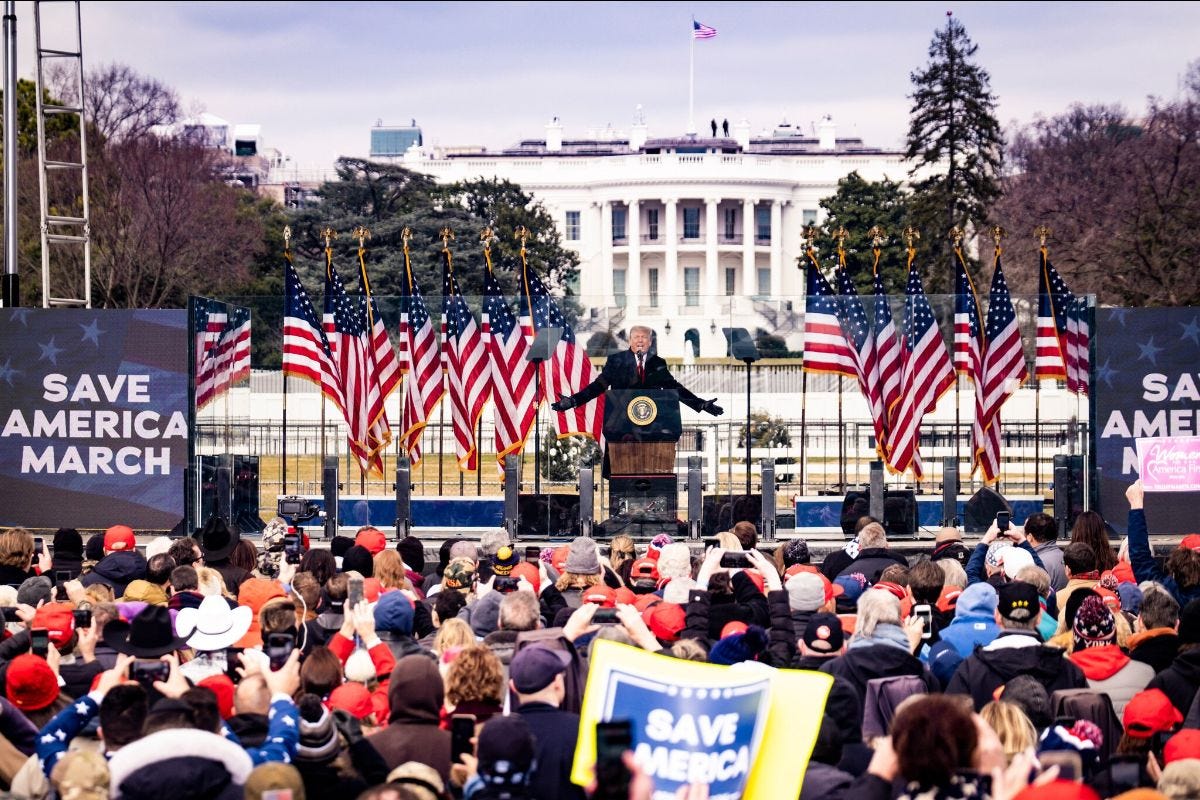
Q: If the January 6 commission isn’t approved by the Senate, can’t President Biden create a commission through executive authority and make the composition bipartisan through appointments to the commission? — James from Punta Gorda, FL
A: He could, but he’s signaled that he doesn’t want to. White House Press Secretary Jen Psaki released a statement last week outlining the president’s opposition to appointing his own commission: “Congress was attacked on that day, and President Biden firmly agrees with Speaker Pelosi that Congress itself has a unique role and ability to carry out that investigation,” Psaki said.
With the independent commission blocked by the Senate and Biden nixing a presidential commission, Democrats are likely to pursue a different Plan B: a select committee in the House. Select committees are special, temporary panels created by a chamber of Congress; unlike a presidential commission, they can be granted special funding and subpoena power. Republicans used a select committee to investigate the Benghazi attack during the Obama administration; Democrats have established one focused on climate change.
Democrats are still debating whether to create a select committee and what it would look like. Members of such panels are generally appointed by the two party leaders, with a chairman from the majority party and a ranking member from the minority. A House select committee can be formed by a majority vote of the House.

Do you have a question on politics you want answered? Send it to me by email or by filling out this form and it might be featured in the newsletter! Don’t forget to include your first name and where you’re from.
Daybook
What’s happening in Washington today. (All times Eastern.)
Executive Branch
President Joe Biden will receive his daily intelligence briefing at 9:50 a.m. He will meet with Jens Stoltenberg, the Secretary General of the North Atlantic Treaty Organization (NATO), at 4:30 p.m. to discuss the NATO summit in Brussels next week and “reinforcing transatlantic security in the face of challenges from Russia and China.”
Vice President Kamala Harris arrived in Guatemala City on Sunday for her first foreign trip since taking office. At 10:35 a.m., she will meet with Guatemalan President Alejandro Giammattei. At 12:35 p.m., Harris and Giammettei will hold a joint press conference.
At 2:45 p.m., Harris will participate in a roundtable with Guatemalan community and civil society leaders to discuss the root causes of migration. At 4:25 p.m., she will participate in an event “where she will see projects designed by young female engineers and meet with women entrepreneurs” and “discuss the factors that prevent people from building a future for their families in their home communities.”
Harris will then travel to Mexico City for the next leg of her trip.
White House Press Secretary Jen Psaki will hold a press briefing at 12:30 p.m. with National Security Advisor Jake Sullivan. It will be the first White House press briefing with a full room of reporters since March 2020.
Only 14 reporters were allowed in the briefings, on a rotating basis, for much of the pandemic; the capacity was expanded to 24 last month. All 49 seats will be full today.
Legislative Branch
The Senate will convene at 3 p.m. after a week of recess. Following Leader remarks, the chamber will resume consideration of the nomination of Julien Xavier Neals to be a U.S. District Judge for the District of New Jersey.
At 5:30 p.m., the chamber will hold a cloture vote to cut off debate on Neals’ nomination.
The House is not in session.
The House Foreign Affairs Committee and the House Appropriations Committee will hold hearings at 10 a.m. and 2:30 p.m., respectively, on the State Department’s Fiscal Year 2022 budget request. Secretary of State Antony Blinken will testify at both.
Judicial Branch
The Supreme Court will release orders at 9:30 a.m. and may announce opinions at 10 a.m.
Presidents Club
Former President Barack Obama will participate in a CNN special with Anderson Cooper at 8 p.m. to discuss “fatherhood, leadership, and legacy.”
Thanks for waking up to politics! If you enjoy reading this newsletter, I’d be so grateful if you’d consider donating to help support me and my work. If you want to show off your support for Wake Up To Politics, you can also buy some merchandise.
Also: don’t forget to tell your friends and family to sign up for the newsletter using your unique referral link. And if you have any questions or comments, feel free to email me at any time.


